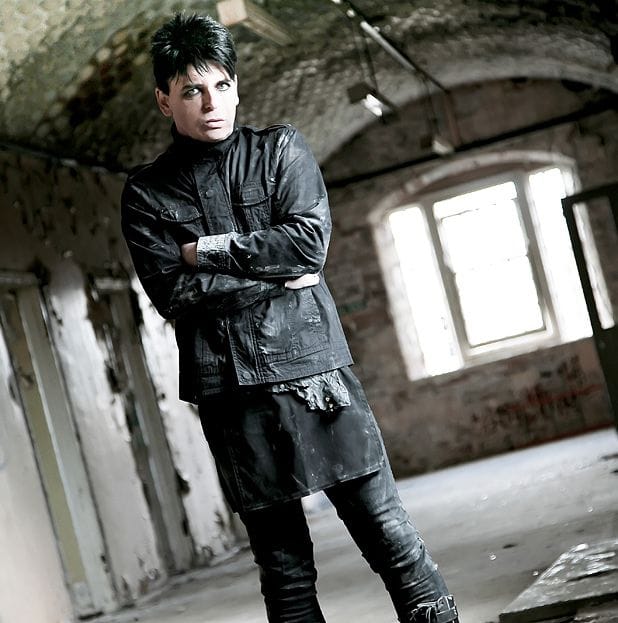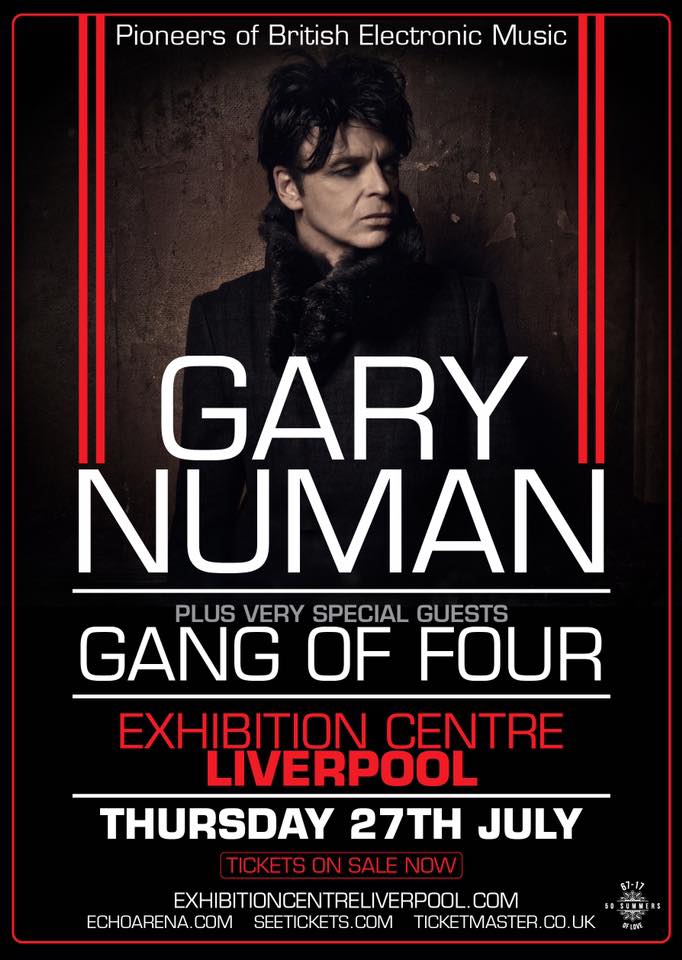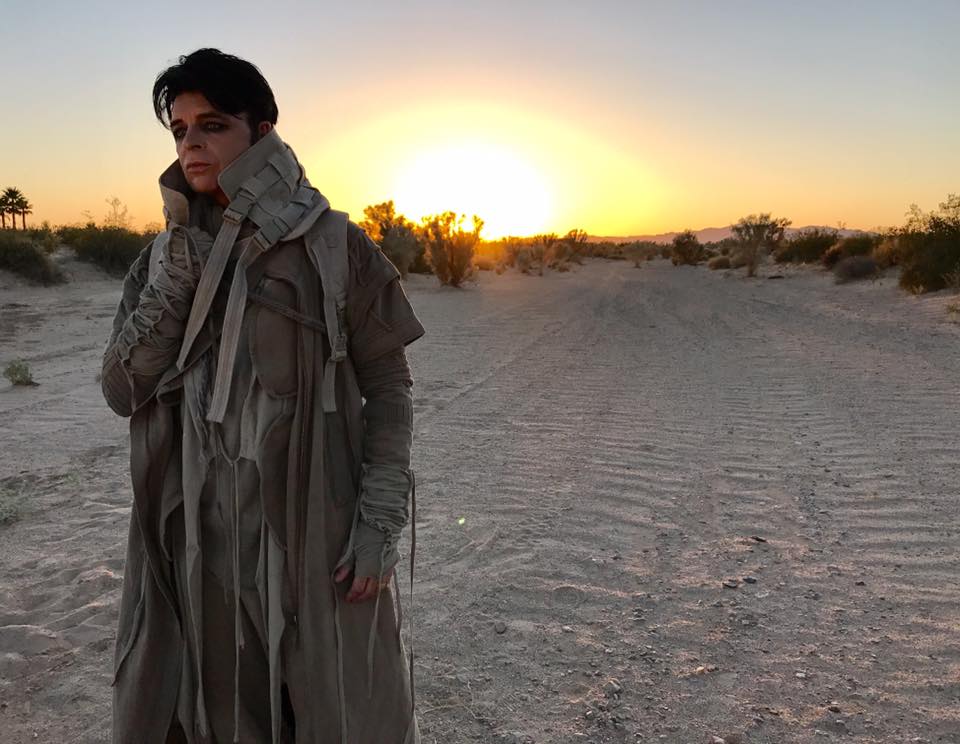It’s fair to say Gary Numan’s career has been something of a roller-coaster of a ride. After being thrust into the limelight with his huge dystopian synth pop anthem ‘Are Friends Electric?’ Numan seemed ill-prepared for the type of attention his new-found fame had brought him. Despite him having developed a huge cult fan base of “Numanoids” many old school music press hacks brought up on solid ‘manly’ guitar based rock were often dismissive of Numan’s work. Their sniffy blinkered attitudes had little effect on Numan’s sales or popularity although he has admitted he stopped reading reviews as he found the whole experience “too depressing.” However, over time changes in fashion, and that fractious relationship with the press and equally with record labels saw Numan’s star begin to fade. He faced near bankruptcy, suffered periods of depression and finally reassessed his own relationship with music. After giving up on the idea of future chart success Numan started to write music that was much darker, heavier and more industrial in tone which surprised many critics who also began to reassess Numan’s oeuvre.
This heavier sound and the fact that artists such as Nine Inch Nails Trent Reznor cited Numan as a hugely important influence saw Numan’s music being embraced by a whole new audience beyond his cult fanbase. The 2012 documentary ‘Android in La La Land’ followed Numan and his family’s relocation to L.A. as he also began to record one of his most critically acclaimed albums to date ‘Splinter’ and revealed the man behind the mask. In it, he talks candidly about Aspergers, his emotional difficulties, and his depression as well as his devotion to his wife Gemma and their daughters.
He is now widely regarded as one of THE pioneers of electronic music and has been working on a new Album ‘Savage’ via Pledge Music and he arrives at Liverpool’s Exhibition Centre to play these songs live for the first time on 27th July 2017.
Tickets – SEE Tickets & exhibitioncentreliverpool.com
We chatted to Gary about fame, the new album and his move to L.A.
____________________________________
Hi Gary , so the Liverpool show is the first show of the ‘Savage’ album tour. You’ve said in the past you love touring so it must be exciting to finally get out there again and play new songs live for the first time?
GN: It is exciting, yes. An album takes a long time to make, and it’s a process full of emotional challenges and crisis, so it’s always a mixture of relief and dread when they’re finished. Relief that it’s done, and dread that it’s done, with no way of improving it. Taking the new songs out on stage is always fun though. New songs in a live set are like breaths of fresh air after a long stint in a dark, sweaty room. Seeing how the fans react, seeing how the band react for that matter, it’s one of the most exciting parts of what we do. I’m really looking forward to it.
What can we expect from the Numan live experience this time around and indeed the new album. What are the major themes running through ‘Savage’?
GN: Savage is a future themed album that looks at what life may become should the global warming situation not be stopped in time and the problem becomes an unstoppable apocalypse. The environment that’s left, and the few people that survive would be savage and hostile. It really took shape lyrically when Trump became President but, for the most part, it takes ideas from a novel that I’ve been working on for so long it’s become an embarrassment to even mention it. The world is a barren desert, water is currency, people are savage, the environment even more so, cultures have merged but more as a need to survive than any kind of new tolerance or understanding of our differences. Small tribal communities are the norm, with all the bizarre rituals that tribal communities seem to slide into. Violence is as natural as breathing in, dying is as common as breathing out, and somewhere, someone has found the remnants of an ancient religious book, and it all goes downhill from there.
The music industry has undergone seismic shifts since you began your career , what was it that attracted you to taking the ‘Pledge’ route this time around and how have you found the entire experience ?
GN: I’ve found the experience to be a very good one overall. With Pledge, I wanted to bring fans into the album making progress from day one, from the first note played to the shrink-wrapped album arriving on their doorstep. I wanted them to witness all the ups and downs, the good days, frustrating days, angry days, desperate days, all of it. How the ideas first form, why they change, how they evolve. From my first rough sketch of a cover idea to the finished photo shoot, from initial song title idea to finished lyric, from a demos rough first take vocal to the finished mastered track, all of it. In many respects it’s a glorious pre-sale but, in truth, it’s much more than that. From what I can see fans have loved it and I would be more than happy to think about doing another one.

You’ve been working again with Ade Fenton on ‘Savage’, which is the 4th album you’ve worked on together – how did you guys originally hook up and why do you think you seem to work so well together?
GN: We were friends for a long time before we started doing music together. Ade originally was a Techno DJ and so musically we had little in common but then he started to write his own non-Techno stuff, much heavier mire industrial things, and I was really impressed with his production skills. Eventually I asked him, as a test really, to work on a couple of my songs and he did a great job. It just went on from there. He’s amazing though, an absolutely brilliant producer and I can’t speak highly enough of his contribution to Savage and all the other albums he’s worked on.
During your earlier career you had sometimes strained relationship with the press, did this ever effect your confidence as an artist? you’ve spoken in the past that having Asperger syndrome was actually beneficial in that you could kind of shut things down and focus on what you needed to do?
GN: I’ve never been confident, never. I have always felt like that confidence trickster who can’t believe he’s got away with it for so long. I’, sometimes accused of being too humble, or falsely humble at times, but it’s not that at all. I am still very intimidated by genuine talent and I do not see myself as being up there with those people. Aspergers is a real help, no doubt about it. It helped me to push away things that weren’t directly helpful or important in the early days. Things like negative reviews and hostile articles, and even unpleasant people from time to time. These days, of course, things are very different and I find Aspergers comes in handy in other ways, focus, determination, my obsession with where I’m going and how to make that happen. I still struggle for confidence though so the Aspergers forces me through all those doubts.
The documentary “Android In La La Land” detailed your move to L.A. with your family and the recording of your critically acclaimed album Splinter. How have you all settled into life in L.A.? Anything you miss about living in the UK?
GN: I love being in L.A. very much and I don’t regret the decision to move at all. But, I definitely miss things about the UK. My longer term friends are there, my Dad and brother (my Mum died last year sadly), most of my life’s memories are a part of my British life so it’s never far away. I miss simple things, pub lunches in the summer, Fish and Chip shops, castles, English Heritage days out, flying, all sorts of things. I really enjoy touring in the UK now because it gives me a huge dose of Britishness. Luckily though I’m actually in the UK several times a year for one reason or another so I get little shots of it constantly, and then I fly back to the sun.
The documentary also touched on your early career and the huge fame you enjoyed initially with Tubeway Army and then as a solo artist. But perhaps the word ‘enjoyed’ isn’t entirely accurate as fame itself seem to leave you more isolated?
GN: I struggled with it to begin with that’s certainly true. It took me too long to adapt to it as well so, by the time I’d started to, it was already sliding away. It’s been a battle ever since, to be honest. I made a bit of a mess of that early peak and didn’t enjoy it the way a more mature person probably would have. But, we do what we do and learn from it as best we can. These days I have a level of respect that most bands would die for so I can’t grumble, it’s more than making up for my early troubles that’s for sure. In short, I wouldn’t change a thing. The experiences we live through make us the person and artist we become, and I’m happy with what I’ve become. It’s one of the benefits of being around for such a ridiculously long time I guess.
It’s great that you’re enjoying the whole experience differently this time. Has having more creative control been a major factor?
GN: Absolutely true. I think the difference comes for a number of reasons. Simple experience is one of them. The longer you do this the less scary it becomes, the less stressful, the better at it you get. I mean all of it as well, writing, performing, interviews, dealing with problems, dealing with people, keeping fans happy, allocating time, minimising pressure, all of it. Control is another factor. I manage myself now, I have my own label that I license out per album, I run everything or have a close team around me, depending on what project it is. I write what I want, look the way I want, I’m not shaped, pushed or pulled by anyone. I do what I want, the way I want, and most importantly of all I enjoy simply being in a band, touring the world, writing songs, living this life.
Although you’ve stated you’ve never been one to look back there must be moments during your career that you’re particularly proud of. Winning an Ivor Novello Award for inspiration award recently must have been special?
GN: I was very proud of the Ivor, that was a career highlight for me. An award for innovation in songwriting from your peers is something very special. I can barely express how important that was for me. I’m proud of a lot of what I’ve done in the past but the thing that’s most important is not to allow yourself to become trapped by it. I am a thousand times more excited about what I’m going to do tomorrow than anything I did in the past, no matter how successful. I live for what might come next, how I can shape that opportunity. I have only the vaguest, passing interest in my most glorious moments from the past because I firmly believe that I will do that again, only better. It’s not arrogance, it’s the reason for being alive in the first place.
Finally, what would you say is (or has been) the biggest misapprehension about Gary Numan.
GN: Ah, a question I find difficult to answer. For a long time, it was thought that I was very stand offish but that was the Aspergers I think. For a while, it was thought that I crashed aeroplanes on a regular basis, where as in truth I’ve never crashed a plane, although I was in a plane crash once. I honestly don’t know anymore. I actually have no idea what people think about me these days. I don’t think people give me much thought at all.
Gary Numan Official Site | Gary Numan Facebook | Gary Numan Twitter | Numan on Pledge


